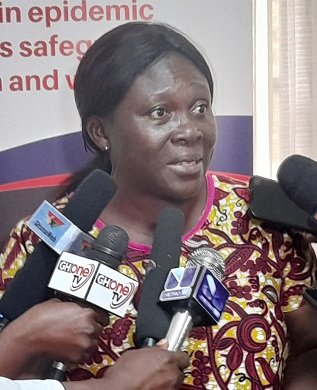News
‘Don’t scrap COVID-19 Levy …establish separate account, ensure accountability’ – SEND Ghana

• Mrs Harriet Agyemang speaking at the forum
Unlike other groups that describe the COVID-19 Levy as “nuisance tax,” Civil Society Group, SEND Ghana has asked the government not to scrap the levy which was introduced about two years ago.
Rather, it wants the levy redirected to addressing existing challenges in the health sector and a separate account established for it.
It said the current arrangement, where the contributions were paid into the Consolidated Fund, made it difficult to independently track how much revenue had accrued from the levy.
Mrs Harriet Agyemang, Senior Programmes Officer, made the call after presenting details of SEND Ghana’s analysis of the 2023 Budget Statement and Economic Policy read in November last year by Finance Minister, Mr. Ken Ofori-Atta.
While advising prudent management of the funds, she said the distinct account for the COVID-19 Levy should as well spell out how the tax was managed and what it would be used for.”
“Until the Finance Ministry comes out to say how much it has collected, you cannot track it [the levy] as you would. This is why we suggest the levy should have [an account] so we know what we are going to use the fund for, who is managing it and how it is being managed so we can call for some accountability every now and then,” she explained.
Mrs. Agyemang added that there were still gaps in the health sector in terms of number and distribution of health professionals across the country, unavailability of equipment, among other challenges, therefore, it was important to put aside adequate resources to address them.
“When COVID-19 struck, we all saw that our health system was not resilient. Communication and health promotion needs to be funded, we need to step up surveillance so that some of these diseases could be identified and nipped in the bud.
“Surveillance is not done only by health professionals but it starts in the communities and we need money to do these. If we were doing it, I am sure the impact of COVID-19 would have been lesser than we felt it,” she added.
She further noted that the decline in donor support for the health sector implied that the government ought to do more to fund the health system and make it more resilient.
Touching on other sectors of the economy, the Programmes Officer urged the Ministry of Finance to release the funds promptly for the projects, initiatives, and interventions captured in the 2023 budget.
“Beyond the budget statement, the ministry should release the funds for their intended purposes. When the funds get to the sector ministries they should also utilise the funds,” Mrs. Agyemang stated.
SEND Ghana, in other parts of its analysis, said although the services sector continued to boom, the government needed to increase investment in the agriculture sector to help reduce importation of essential and basic food commodities.
By Ernest Nutsugah
News
Govt urged to provide safe, supportive environment for menstruating girls

The government has been urged to take urgent steps toward providing a safe and supportive environment for menstruating girls to ensure proper personal hygiene and promote school attendance.
Sarah Nkansah Boateng, a midwife at the Eastern Regional Hospital made the call during a forum organised as part of activities to observe Menstrual Hygiene Day celebration in the New Juaben North Municipality of the Eastern Region.
The event was held under the theme “Together for a Period-Friendly World.”
She noted that many girls skip school during their menstrual periods due to a lack of access to sanitary products and appropriate spaces to change them.
“The basic necessities for these girls are not being provided; creating a safe and enabling environment is crucial,” Madam Boateng emphasized.
She called on school authorities and policymakers to prioritise the construction of hygienic and private changing spaces in schools.
She further appealed for a collective effort to address menstrual health challenges affecting girls in the community.
The New Juaben North Municipal Director of Health Services, Nana Yaa Konadu, also highlighted her office’s initiatives in both school-based and community clinics to educate young girls on menstrual hygiene.
She stressed the health implications of poor menstrual hygiene, saying, “When girls lack access to sanitary pads and a clean environment, it can negatively impact their reproductive health.”
Madam Konadu warned that the absence of menstrual hygiene facilities and products left some girls vulnerable to exploitation, increasing the risk of teenage pregnancy.
The Municipal Chief Executive for New Juaben North, Mr Samuel Adongo, described menstruation as a natural biological process and not a taboo or burden.
He expressed concern over the poor state of sanitation facilities in schools.
“I have visited almost all public schools in the municipality, and none has a proper, standard toilet facility suitable for girls,” he stated.
Mr Adongo assured that the assembly would work to create an enabling environment to reduce school absenteeism related to menstruation.
“Too many girls are missing school because of their menstrual cycle, and this is unacceptable,” he added.
From Ama Tekyiwaa Ampadu Agyeman, Koforidua
News
Akwesi Agyeman, Ekpe vow to lead GJA to ‘era of purpose and professionalism’

As the Ghana Journalists Association (GJA) prepares for its national elections, two of the key contenders, General Secretary Aspirant Akwasi Agyeman and Vice Presidential hopeful Rebecca Ekpe have called for a return to ethical journalism, stronger mentorship and institutional reforms.
They both made the remarks during separate visits to The Spectator and The Ghanaian Times, respectively to solicit for votes.
Akwasi Agyeman, an Editor with Multimedia is seeking to lead the association into what he calls a “new era of purpose and professionalism.”
He stressed the urgent need to reposition the GJA as a strong and relevant voice in national affairs.
“We cannot continue with business as usual. The GJA must be visible, active, and fearless in advocating for the rights and welfare of journalists,” he said during a meeting with media practitioners in Accra.
Mr. Agyeman noted that his leadership will focus on building partnerships, improving member services, and restoring the dignity of the Association. “We need to rekindle the spirit of solidarity within the GJA and provide real value to members, especially the younger generation,” he added.
Ms Rebecca Ekpe, a respected Broadcast Journalist and Editor, echoed similar sentiments in her call for mentorship and capacity building.
“I discovered through my journey that journalism is not just my job, it is who I am. My path in journalism was shaped by my seniors in the newsroom, and now I feel called to give back,” she said.
Ms Ekpe envisions a GJA where senior journalists regularly engage with young professionals through face-to-face mentoring and training platforms. “Even if you attend a session and pick just one idea, it could change the course of your career,” she remarked.
She also raised concerns about the rise of misinformation and the blurred lines between journalism and social media content creation. “People sit online insulting others and call themselves journalists. When they are attacked, GJA defends them, but we must ask: are they truly journalists? We must protect the integrity of our profession,” she stressed.
The Editor of The Spectator, Mrs Georgina N.M Quaittoo wished them well in their campaigns and quest to serve the GJA.
By Esinam Jemima Kuatsinu






